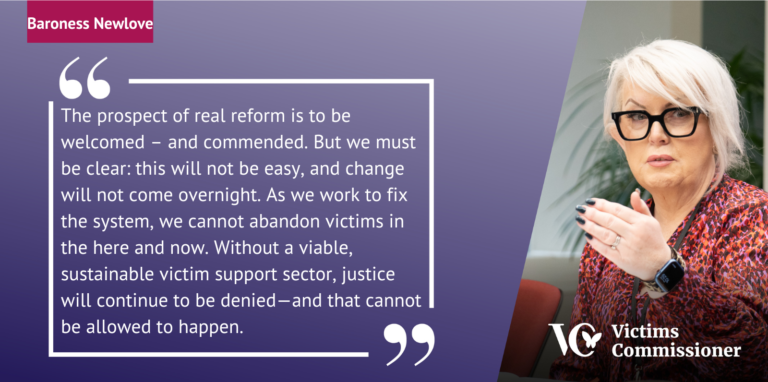Review of courts welcomed as Victims’ Commissioner warns of risks from cuts to support services

"I fear this reduction in support will prompt some victims to simply walk away from seeking justice—a second injustice compounding the first."
Baroness Newlove has welcomed the appointment of Sir Brian Leveson, former President of the Queen’s Bench Division, to lead an independent review into the criminal courts.
Announced by the Ministry of Justice (MoJ), the review will explore the case for establishing “intermediate courts” to bridge the gap between magistrates and Crown Courts. It will also examine whether magistrates should be given a broader remit, including expanded sentencing powers, in an effort to speed up trials and reduce the swelling backlog of cases.
The announcement follows the release of data showing Crown Court backlogs have reached an unprecedented high, with 73,000 trials awaiting hearing as of September—more than double the figure in 2019. The backlog is expected to grow further. In some instances, victims of serious crimes, such as rape, face waits of up to four years before their cases go to trial.
In her statement, Baroness Newlove emphasised the need to place victims at the heart of the review and any subsequent reforms. However, she warned that funding cuts to victim services risk increasing attrition rates, further compounding the challenges posed by record Crown Court delays.
The Victims’ Commissioner for England and Wales, Baroness Newlove, said:
“A backlog of over 73,000 cases represents a failure of our justice system —and it cannot go on. Change must come.
“I commend the government for recognising the need for reform, and this review is a constructive step forward. As Victims’ Commissioner, I have long called for innovative and bold solutions to address this crisis, so I welcome this announcement and the involvement of Sir Brian Leveson. I want to see victims at the heart of this process—not an afterthought—and I will work tirelessly to ensure their voices are heard.
“The impact on victims of this backlog cannot be overestimated. Many victims have shared their frustrations with me, unable to move on with their lives as they wait months, and in some cases, years for their case to get to trial.
“It is paramount victims emerge from our justice system with a sense of justice, not additional trauma. Yet many cases will never reach trial, as victims and witnesses find they simply cannot last the distance. It is true to say justice delayed is justice denied.
“For this reason, a strong, viable and sustainable victim support sector is not optional—it is essential. These services are a lifeline for victims, left in limbo, often dealing with trauma as they wait for justice. Yet the threads of this vital safety net are fraying.
“Unsustainable caseloads, mounting waiting lists, and crises in recruitment and retention are pushing services to the brink. Victims are not only waiting for their day in court but also enduring long waiting lists for the vital specialist support they urgently need.
“This is why I am disappointed victim support services are once again facing a real-terms funding cut. This will result in victim support workers being made redundant and services being pared back. I fear this reduction in support will prompt some victims to simply walk away from seeking justice—a second injustice compounding the first.
We have struggled on with short-term sticking plaster solutions for too long. The prospect of real reform is to be welcomed – and commended. But we must be clear: this will not be easy, and change will not come overnight. As we work to fix the system, we cannot abandon victims in the here and now. Without a viable, sustainable victim support sector, justice will continue to be denied—and that cannot be allowed to happen.”
